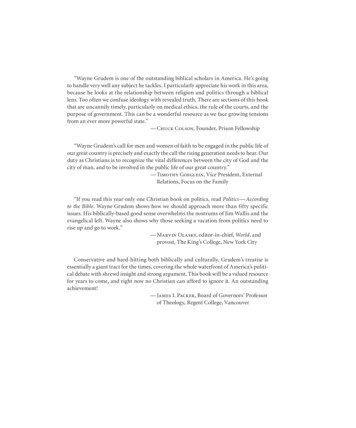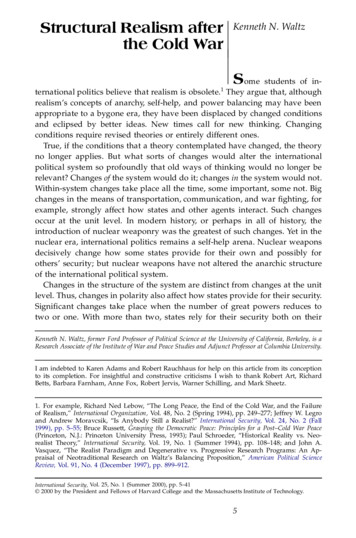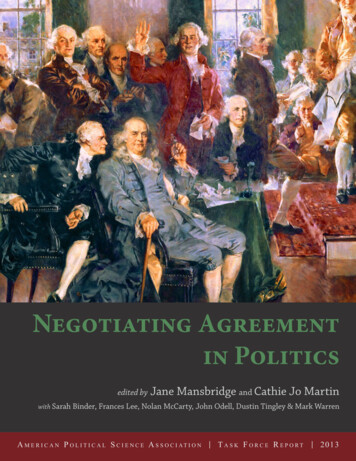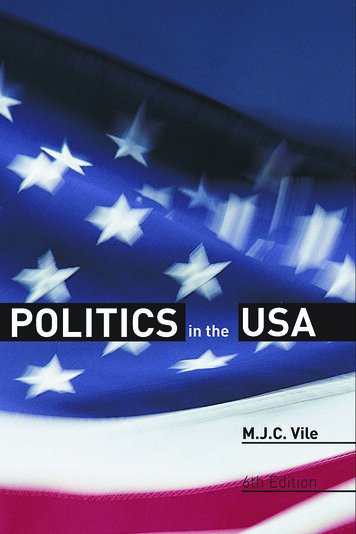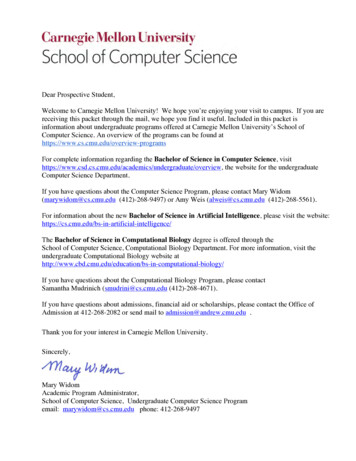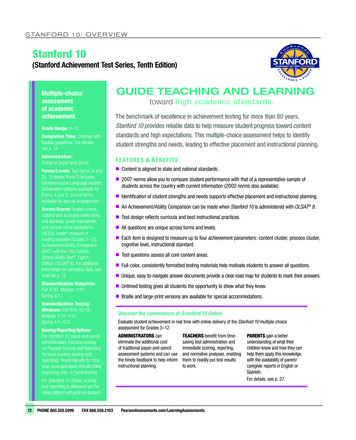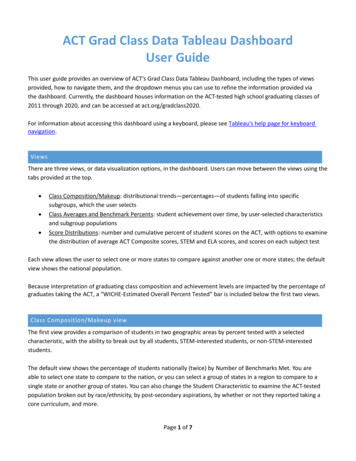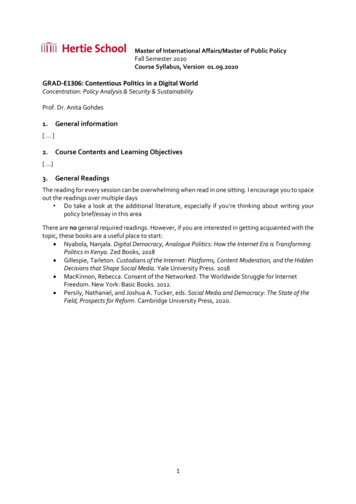
Transcription
Master of International Affairs/Master of Public PolicyFall Semester 2020Course Syllabus, Version 01.09.2020GRAD-E1306: Contentious Politics in a Digital WorldConcentration: Policy Analysis & Security & SustainabilityProf. Dr. Anita Gohdes1. General information[ ]2. Course Contents and Learning Objectives[ ]3. General ReadingsThe reading for every session can be overwhelming when read in one sitting. I encourage you to spaceout the readings over multiple days Do take a look at the additional literature, especially if you’re thinking about writing yourpolicy brief/essay in this areaThere are no general required readings. However, if you are interested in getting acquainted with thetopic, these books are a useful place to start: Nyabola, Nanjala. Digital Democracy, Analogue Politics: How the Internet Era is TransformingPolitics in Kenya. Zed Books, 2018 Gillespie, Tarleton. Custodians of the Internet: Platforms, Content Moderation, and the HiddenDecisions that Shape Social Media. Yale University Press. 2018 MacKinnon, Rebecca. Consent of the Networked. The Worldwide Struggle for InternetFreedom. New York: Basic Books. 2012. Persily, Nathaniel, and Joshua A. Tucker, eds. Social Media and Democracy: The State of theField, Prospects for Reform. Cambridge University Press, 2020.1
4. Session OverviewSessionSessionDateSession Title108.09.2020Introduction- What’s the Internet got to do with it?- Liberation technology?!215.09.2020Non-state actors I: Mass-based mobilization322.09.2020Non-state actors II: Slacktivism429.09.2020Non-state actors III: Hacktivism506.10.2020Non-state actors IV: Radicalization613.10.2020State and non-state actors: The role of the Internet in civil warMid-term Exam Week: 19.10 - 23.10.2020 – no class727.10.2020State actors I: Cyberattacks803.11.2020State actors II: Autocrats online910.11.2020Digital Platforms I: Media manipulation1017.11.2020Digital Platforms II: Hate speech1124.11.2020Digital Platforms III: Content Moderation1201.12.2020Looking into the future: Big data, technology and contentiouspoliticsFinal Exam Week: 14.12 - 18.12.2020 – no class2
5. Course Sessions and Readings[ ]Session 1: IntroductionLearning ObjectiveWhy should we care about the Internet? What did researchers think aboutthe effects of the Internet 5-10 years ago? Why should we care about afree and accessible Internet?The session will be divided into two parts:- Introduction? What’s the Internet got to do with it?- Liberation technology?!Required Readings---Optional Readings----Hillary Rodham Clinton. Remarks on Internet Freedom. January 21,2010. URL on/rm/2010/01/135519.htmJurgenson, Nathan. "Digital dualism versus augmented reality." TheSociety Pages 24 ren, Neal, Kenneth T. Andrews, and Todd Lu. "Contemporary SocialMovements in a Hybrid Media Environment." Annual Review ofSociology 46 (2020): y-2020/caren-contemporary-2020.pdfLarry Diamond. Liberation technology. Journal of Democracy,21(3):69–83, 2010. URL atis/Diamond-21-3.pdfSean Aday, Henry Farrell, and Marc Lynch. Blogs and bullets: Newmedia in contentious politics. United States Institute of Peace,Peaceworks, 65, 2010Clay Shirky. The political power of social media: Technology, thepublic sphere, and political change. Foreign Affairs, 90:28, 2011. URLhttps://www.cc.gatech.edu/ beki/cs4001/Shirky.pdfBlake Hounshell. The revolution will be tweeted. Foreign Policy, 20June, 2011. 0/the revolution willbe tweeted3
Session 2: Non-state actors I: Mass-based mobilizationLearning ObjectiveRequired ReadingsOptional ReadingsHow has the Internet changed mobilization processes? What theoriesexplain these changes? How can we measure the effects of online activityon mobilization? How can we reconcile the empirical findings of differentstudies? What does mass-based mobilization look like in the 21st century?- Lohmann. S. "The dynamics of informational cascades: the Mondaydemonstrations in Leipzig, East Germany, 1989–91." Worldpolitics 47.1 1994.: 42-101.- Steinert-Threlkeld, Z. C., Mocanu, D., Vespignani, A., & Fowler, J.(2015). Online social networks and offline protest. EPJ Data Science,4(1), 1-9.- Valenzuela, S. (2013). Unpacking the use of social media for protestbehavior: The roles of information, opinion expression, and activism.American Behavioral Scientist, 57(7), 920-942.---Golnaz Esfandiari. The twitter devolution. Foreign Policy, June /06/07/the twitter revolution that wasntWeidmann, Nils B., & Rød, Espen G. (2019). The Internet and politicalprotest in autocracies. Oxford University Press.Allmann, Kira C. "Mobile Revolution: Toward a History of Technology,Telephony and Political Activism in Egypt." Cyber Orient 8.2 (2014):46.Kuran, Timur. "Now out of never: The element of surprise in the EastEuropean revolution of 1989." World politics 44.1 (1991): 7-48.Pearce, Katy. 2018. “Livestreaming Armenia’s “velvet revolution”URL: armeniasvelvet-revolutionZeynep Tufekci and Christopher Wilson. Social media and the decisionto participate in political protest: Observations from tahrir square.Journal of Communication, 62(2):363–379, 2012Anita Breuer, Todd Landman, and Dorothea Farquhar. "Social mediaand protest mobilization: Evidence from the Tunisian revolution."Democratization 22.4. 2015.: 764-792.4
Session 3: Non-state actors II: SlacktivismLearning ObjectiveRequired ReadingsOptional ReadingsWhat is “slacktivism”? Where do we see slacktivism happening? Doesslacktivism work, and if so, under what conditions?We’ll explore the dynamics of various “hashtag” campaigns.- Evgeny Morozov. "The brave new world of slacktivism." Foreignpolicy 19.05. 2009. URL world-of-slacktivism/- Christensen, H. S. (2011). Political activities on the Internet:Slacktivism or political participation by other means?. First rticle/view/3336/2767- Barberá, Pablo, Ning Wang, Richard Bonneau, John T. Jost, JonathanNagler, Joshua Tucker, and Sandra González-Bailón. “The CriticalPeriphery in the Growth of Social Protests.” PLOS ONE 10(11). 2015.e0143611. phanie Vie. "In defense of “slacktivism”: The Human RightsCampaign Facebook logo as digital activism." First Monday 19.4 2014.URL view/4961/3868Ethan Zuckerman. Cute cats to the rescue? participatory media andpolitical expression. In Danielle Allen and Jennifer Light, editors,Youth, New Media and Political Participation. Cambridge, MA: MITPress, 2014. accari, C., Valeriani, A., Barberá, P., Bonneau, R., Jost, J. T., Nagler,J., & Tucker, J. A. (2015). Political expression and action on socialmedia: Exploring the relationship between lower-and higherthreshold political activities among Twitter users in Italy. Journal ofComputer-Mediated Communication, 20(2), 221-239.Session 4: Non-state actors IV: HacktivismLearning ObjectiveRequired ReadingsWhat are hacktivists? What can we learn from the rise of “Anonymous”?What are the political consequences of online groups taking “justice”into their own hands?- Friedman, Allan, and P. W. Singer. "Cybersecurity and Cyberwar:what everyone needs to know.", Oxford University Press. 2014.pages 77-84.- Lorenz, Taylor, Kellen Browning and Sheera Frenkel. 2020: “TikTokTeens and K-Pop Stans Say They Sank Trump tiktok-trump-rallytulsa.htmlPodcast:-Techdirt Podcast Episode 18: The Many Faces Of Anonymous, WithGabriella /12075930501/techdirt-5
ellacoleman.shtml-Optional Readings--Barlow, John Perry. "A Declaration of the Independence ofCyberspace." 1996. URL https://www.eff.org/cyberspaceindependenceSauter, Molly. "“LOIC Will Tear Us Apart” The Impact of Tool Designand Media Portrayals in the Success of Activist DDOS Attacks."American Behavioral Scientist 57.7 (2013): 983-1007.Gabriella Coleman. Hacker, hoaxer, whistleblower, spy: The manyfaces of Anonymous. Verso books, 2014.Molly Sauter. The coming swarm: DDOS actions, hacktivism, and civildisobedience on the Internet. Bloomsbury Publishing USA, 2014.Menn, Joseph. Cult of the Dead Cow: How the Original HackingSupergroup Might Just Save the World. PublicAffairs, 2019.Session 5: Non-state actors II: RadicalizationLearning ObjectiveDoes online radicalization work, and if so, how? How can we measure it?Required Readings---Optional Readings----The New Radicalization of the Internet - The New York Times. 24November 2018. day/facebooktwitter-terrorism-extremism.htmlGill, P., Corner, E., Thornton, A., & Conway, M. (2015). What are theroles of the Internet in terrorism? Measuring online behaviours ofconvicted UK terrorists. https://www.voxpol.eu/download/voxpol Terrorism.pdfTamar Mitts. “From Isolation to Radicalization: Anti-Muslim Hostilityand Support for ISIS in the West.” American Political ScienceReview, forthcoming. 1-22. , Maura (2017). Determining the role of the internet in violentextremism and terrorism: Six suggestions for progressing research.Studies in Conflict & Terrorism, 40(1), 77-98.Fielitz, M., & Marcks, H. (2019). Digital Fascism: Challenges for theOpen Society in Times of Social Media. UC Berkeley: Center for RightWing Studies.Daniels, Jessie (2018). The algorithmic rise of the “alt-right”. Contexts,17(1), 60-65.Jonathon M. Berger and Jonathon Morgan. "The ISIS Twitter Census:Defining and describing the population of ISIS supporters on Twitter."The Brookings Project on US Relations with the Islamic World 3.20.2015. URL 6/isis twitter census berger morgan.pdfBerger, J. M. (2015). The metronome of apocalyptic time: Socialmedia as carrier wave for millenarian contagion. Perspectives onTerrorism, 9(4), 61-71.6
Session 6: State and non-state actors: The role of the Internet in civil warLearning ObjectiveHas the Internet changed the propensity for violent conflict? Has itchanged dynamics of conflict? How do states use the fact that they arein control of most of the Internet infrastructure to their militaryadvantage? How do conflict actors communicate with the outside worldduring wartime?Required Readings-Anita R. Gohdes 2020 “Repression technology: Internet accessibilityand state violence”, American Journal of Political Science.Benjamin T. Jones and Eleonora Mattiacci. “A manifesto, in 140characters or fewer: Social media as a tool of rebel diplomacy.”British Journal of Political Science. 1-23. 2017Podcast:- Motherboard Cyber Podcast: “The Cyberwar In Yemen”https://www.vice.com/en us/article/qvgk5x/the-cyberwar-in-yemenOptional Readings---Anita R. Gohdes. 'Studying the Internet and Violent Conflict', ConflictManagement and Peace Science, 35(1), 89-106. 2018.Marc Lynch, Deen Freelon, and Sean Aday. Blogs and bullets iii:Syria’s social mediated war. United States Institute of Peace,Peaceworks, 91, 2014Jan H. Pierskalla and Florian M. Hollenbach. Technology andcollective action: The effect of cell phone coverage on politicalviolence in africa. American Political Science Review, 107(2):207–224,May 2013.Thomas Zeitzoff. "How social media is changing conflict." Journal ofConflict Resolution 61.9. 2017. 1970-1991.Mid-term Exam Week: 19 – 23.10.2020 – no classSession 7: State-actors I: CyberattacksLearning ObjectiveWhat is a cyberattack? What types of cyberattacks exist? What is cyberwarfare? How can we measure cyber warfare?Required Readings--Optional Readings-Schneier, Bruce. Secrets and lies: digital security in a networkedworld. John Wiley & Sons, 2011, pages 14-22Kostyuk, Nadiya and Yuri M. Zhukov. “Invisible Digital Front: CanCyber Attacks Shape Battlefield Events?” Journal of ConflictResolution. 2017.Singer, Peter and August Cole: “The Reality of Cyberwar”, Politico,2015. URL ereality-of-cyberwar-119915Podcast: Popular Front 25: The real cyber the-real-threat-ofcyber-warfare7
---Podcast: BBC The Real Story: Cyberwarfare: The Digital z63Podcast: F-Secure Podcast Episode 20 Defining Cyber Warfare, withMikko Hypponen: ko/Erik Gartzke. “The Myth of Cyberwar Bringing War in CyberspaceBack Down to Earth”, International Security. Vol. 38, No. 2. 2013. 41–73.Sanger, David E. The Perfect Weapon: War, Sabotage, and Fear in theCyber Age. Broadway Books, 2019.[Movie]: Zero Days (a movie about Stuxnet):http://www.zerodaysfilm.com/Session 8: State-actors II: Autocrats onlineLearning ObjectiveHow do autocratic states make use of the Internet? How do they manageto use it to their own advantage? What is ‘networked authoritarianism’?What are the global trends on Internet control?Required Readings-Optional Readings-Gunitsky, Seva. 2015. Corrupting the cyber-commons: Social media asa tool of autocratic stability. Perspectives on Politics, 13:42–54,http://journals.cambridge.org/article S1537592714003120Focus on the Philippines- Part 1: Mendoza, Gemma Bagayaua (2019) “Networked propaganda:How the Marcoses are using social media to reclaim igative/marcos-networkedpropaganda-social-media- Part 2: Mendoza, Gemma Bagayaua (2019) “Networked propaganda:How the Marcoses are rewriting ting-history---Podcast: Himal Southasian Podcast Channel: Interview with AnitaGurumurthy on data and surveillance s-between-big-data-andbig-brother-2020/Rebecca MacKinnon. China’s" networked authoritarianism". Journal ofDemocracy, 22(2): 32–46, 2011Freedom of the Net Report 2018, Freedom House. TN 2018 Final%20Booklet 11 1 2018.pdfJaclyn A. Kerr. “Rewiring Authoritarianism: The Evolution of InternetPolicy in Putin’s Russia, Working Paper, 2016Espen Geelmuyden Rød and Nils B Weidmann. Empowering activistsor autocrats? the internet in authoritarian regimes. Journal of PeaceResearch, 52(3):338–351, 2015Katy E. Pearce and Sarah Kendzior. Networked authoritarianism andsocial media in Azerbaijan. Journal of Communication, 62(2):283–298,2012.8
-Ronald Deibert, John Palfrey, Rafal Rohozinski, Jonathan Zittrain, andMiklos Haraszti. Access controlled: The shaping of power, rights, andrule in cyberspace. The MIT Press, 2010, chapters 1 and 2Session 9: Digital Platforms I: Media ManipulationLearning ObjectiveRequired ReadingsOptional ReadingsWhat does media manipulation look like in the digital age? What is thedifference between misinformation, disinformation, and propaganda?How does the modern Internet architecture facilitate manipulation andthe spread of disinformation? What are data voids, and what have memesgot to do with all of this?- Guess, Andrew M. and Benjamin A. Lyons. 2020. “Misinformation,Disinformation, and Online Propaganda”, chapter 2 in Social Mediaand Democracy: The State of the Field, Prospects for Reform,Cambridge University Press. http://tiny.cc/SocMedDemoc- Golebiewski, Michael and danah boyd. 2019. “Data Voids- WhereMissing Data Can Easily Be Exploited”, Data & Society Report 9/10/Data Voids Final.pdf- Donovan, Joan, 2019: How memes got weaponized: A short /132228/political-warmemes-disinformation- Lazer, D. M., Baum, M. A., Benkler, Y., Berinsky, A. J., Greenhill, K. M.,Menczer, F., [.] & Schudson, M. (2018). The science of fake news.Science, 359(6380), 1094-1096.- Alice Marwick and Rebecca Lewis. “Media Manipulation andDisinformation Online”, Data & Society Report. 2017. URLhttps://datasociety.net/pubs/oh/DataAndSociety MediaManipulationAndDisinformationOnline.pdf- Keller, F. B., Schoch, D., Stier, S., & Yang, J. (2020). PoliticalAstroturfing on Twitter: How to coordinate a disinformationCampaign. Political Communication, 37(2), 256-280.- Marwick, Alice, and B. Lewis. "The Online Radicalization We’re NotTalking About." New Yorker 18 May 2017. ine-radicalizationwere-not-talking-about.html- Benkler, Yochai, Robert Faris, and Hal Roberts. Network Propaganda:Manipulation, Disinformation, and Radicalization in American Politics.Oxford University Press, 2018.9
Session 10: Digital Platforms: Hate speechLearning ObjectiveHow has hate speech changed online, and how can we understand itsprevalence? (How) Did hate speech on social media affect dynamics ofethnic cleansing in Myanmar? Why is most of the criticism directed atFacebook?Required Readings----Optional Readings--Siegel, Alexandra A. 2020. “Online Hate Speech”, chapter 4 in SocialMedia and Democracy: The State of the Field, Prospects for Reform,Cambridge University Press. http://tiny.cc/SocMedDemocFrenkel, Sheera (2016) “This Is What Happens When Millions OfPeople Suddenly Get The dBusiness for Social Responsibility (BSR) 2018 “Human Rights ImpactAssessment – Facebook in m/2018/11/bsr-facebookmyanmar-hria final.pdfPodcast: Himal Interviews: Radhika Coomaraswamy on the UNreport on Rohingya crisis, Sep 19, hikacoomaraswamy-on-un-report-on-myanmar/Podcast: The Ezra Klein Show, with Mark Zuckerberg. April 2 2018.URL: nshow/e/53938465Gagliardone, Iginio, Danit Gal, Thiago Alves, and Gabriela Martinez.Countering online hate speech. UNESCO, 2015. 3231Session 11: Digital Platforms III: Content ModerationLearning ObjectiveRequired ReadingsOptional ReadingsWhy has social media content moderation become such a contentiousissue? How does content moderation work, and who gets to decide what ismoderated? What do the community guidelines of various social mediaplatforms tell us about their approach towards moderating content?- Roberts, Sarah T. (2017). Content moderation. In Encyclopedia of BigData. UCLA. URL: https://escholarship.org/uc/item/7371c1hf- Crawford, K., & Gillespie, T. (2016). What is a flag for? Social mediareporting tools and the vocabulary of complaint: New Media &Society, 18( 3), 410–428. https://doi.org/10.1177/1461444814543163- Duarte, N., Llanso, E., & Loup, A. C. (2018, January). Mixed Messages?The Limits of Automated Social Media Content Analysis. ConferencePaper on Conference on Fairness, Accountability, and 7/12/FAT-conference-draft2018.pdf-[Movie] “The Cleaners”. URL: http://www.thecleaners-film.de/Roberts, Sarah T. “Social Media’s Silent Filter” - The Atlantic. /2017/03/commercialcontent-moderation/518796/10
-Myers West, S. (2018). Censored, suspended, shadowbanned: Userinterpretations of content moderation on social media platforms. NewMedia & Society, 20(11), 4366-4383.William L Youmans and Jillian C York. “Social media and the activisttoolkit: User agreements, corporate interests, and the informationinfrastructure of modern social movements.” Journal ofCommunication, 62(2):315–329, 2012Gillespie, Tarleton. Custodians of the Internet: Platforms, ContentModeration, and the Hidden Decisions that Shape Social Media. YaleUniversity Press. 2018“Facebook Algorithms Make It Harder to Catch Extremists“ r/588931/--Session 12: Looking into the future: Big data, technology and contentious politicsLearning ObjectiveLooking into the future: Big data, technology, and contentious politics.Required Readings-Optional Readings--Brayne, Sarah. "Big data surveillance: The case of policing." Americansociological review 82.5 (2017): 977-1008.TBD“Masks, cash and apps: How Hong Kong’s protesters find ways tooutwit the surveillance state”https://www.washingtonpost.com/world/asia 06/15/8229169c-8ea0-11e9-b6f4033356502dce story.htmlBenjamin, Ruha (2019). Race After Technology: Abolitionist Tools forthe New Jim Code. Cambridge: Polity.Noble, Safiya Umoja (2018). Algorithms of oppression: How searchengines reinforce racism. New York: NYU PressGregory, Sam: “Deepfakes and Synthetic Media: Updated Survey ofSolutions against Malicious us-usages/“Deepfakes will challenge public trust in what’s real. Here’s how todefuse them”: how-to-defusethem/Final Exam Week: 14 - 18.12.2020 – no class11
4 Session 2: Non-state actors I: Mass-based mobilization Learning Objective How has the Internet changed mobilization processes? What theories explain these changes? How can we measure the effects of online activity
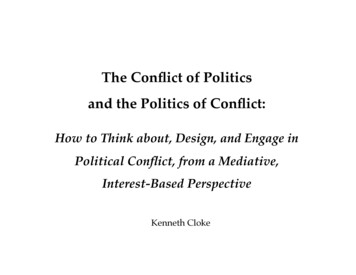
![typoscript [AK] - 28.04.2022 - Seite 1 - 3. Korrektur 227000038/1 .](/img/31/246276-557981bc-27db-5e94-b0b2-b4bf05b1a829.jpg)
